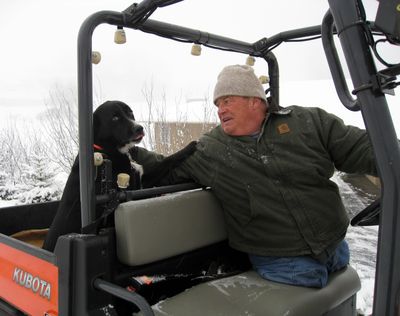Disabled vet was ultimate neighbor

Originally published May 6, 2014
A hero died the other day.
His name was Craig C. Thomas. He was 66 years old, a Spokane lifer who was unashamed to say he loved it here.
I met Thomas several times over the years through a mutual friend. But while we shook hands and talked, I never really knew much about him or what had taken his legs and put him in a chair with wheels.
Then he died and the mutual friend asked if I’d write something, and I said, sure, why not?
That’s how I learned how incredible Craig Thomas was and what happened to him in Vietnam, which wasn’t called a meat grinder for nothing.
Oct. 2, 1968.
Thomas was a year out of Shadle Park High School, just four months into Vietnam. A kid among so many other kids, he had been drafted into the U.S. Army.
The day before, he’d been shot in the side, although it wasn’t even close to a ticket home. Not that Thomas would have gone, anyway.
The minor wound was patched up.
Good to go.
And so on his last day of war, Thomas took the point and led his brothers of Company C, 1st Battalion, 11th Infantry through fields filled with enemy mines, toward a North Vietnamese Army stronghold.
Thomas “realized that without proper guidance, his company’s forward progress would be stalled. And with complete disregard for his own safety, he moved forward and proceeded to clear a path for his fellow comrades.”
That comes from the document that awarded Pfc. Thomas the Silver Star for “extraordinary heroism.”
As Thomas crept through the mines, the enemy, hidden in a “spider hole,” set one off.
The blast blew away one of Thomas’ legs. It tore off almost all the muscle and flesh from the other, leaving bone and a dangling foot and not much else.
“When he woke up after the blast, he said he saw the bluest sky he’d ever seen,” said Char, Craig’s wife of 43 years.
Thomas was evacuated by helicopter to a surgical unit. Then on to Japan, where he spent a year in a hospital bed, trying to heal while surgeons chipped away at what was left.
The remaining leg couldn’t be saved. Not by 1968 medicine, anyway.
And so Thomas came home a “bilateral amputee” at mid-thigh, but a long way from broken.
“He didn’t have any legs, but he wasn’t handicapped,” said Dave McCann, one of Thomas’ closest friends.
“There was never any pity or remorse or sorrow.”
Thomas, in fact, was a hard-charger who threw himself into life like a linebacker.
“He was a man’s man,” added Char, who decided to ask Craig out on a date after his engagement to Connie, her best friend, fell apart. “And we’re still friends,” she added.
He did it all: Scuba diving. Wakeboards. Snow skiing. Trapshooting. Deer hunting …
“There was nothing he wouldn’t try,” said longtime friend Ben Webinger.
Take the time Webinger stopped by the Thomas home.
His jaw practically dropped out of its socket when he looked up to see his legless pal scooting around on the roof with hammer in hand.
Thomas had arranged boards into a scaffold that wouldn’t pass a hillbilly’s safety standards. Then he used his considerable upper-body strength to haul himself to the asphalt summit.
Thomas once broke his thumb in a ski race.
Char made him go to the hospital, where Thomas demanded that the cast be set in a position that would fit around a ski pole.
He was back racing the next day.
Thomas went whitewater rafting. He loved to race around on an ATV, clamping his butt to the seat with carabiners.
Friends once found Thomas puffing on a cigarette moments after he had finished a 10k wheelchair race.
Such anecdotes are called “Craigisms,” noted McCann with a hearty laugh.
Devoted to his family, Craig and Char raised three daughters: Jennifer, Marti and Alexis.
He was gravel-voiced and given to bursts of raucous laughter. Underneath the gruff exterior, however, was a big, soft teddy bear.
Thomas retired after 27 years with Washington Water Power, which became Avista.
Years ago, a photograph of Thomas at work on a downtown street was published in the newspaper. There he is, perched on his wheelchair, a hard hat topping his head.
“The only thing handicapped about Craig Thomas was in other people’s eyes,” said Vance Thornsberry, another longtime friend.
Things started going downhill for Thomas on April 3.
His injuries finally caught up with him. His system began shutting down.
The last three weeks were hell for a brave guy who didn’t want to leave and fought hard to stay.
But to no avail. This time there would be no helicopter rescue.
Inside his North Side home, much of the man remains.
There’s the half-finished kayak he was building. It rests on sawhorses, next to the hand-powered recumbent bike he often rode.
His basement lair is still filled with the things he treasured: military photos and collectibles, DVD movies, a remote-controlled helicopter, antlers from past hunts, a gun safe and vintage stereo equipment.
Like a lot of combat veterans, Thomas didn’t talk much at first about the war or his Silver Star and two Purple Hearts.
But as the years passed, all he had sacrificed “began to define him,” said McCann of his friend.
“Craig wore his Purple Heart cap everywhere. He was very proud of his service to his country.”
Doug Clark